英语表达习惯用法
动词ing的五种用法

动词ing的五种用法动词的 ing 形式,也就是现在分词和动名词,在英语中有着广泛且重要的用法。
接下来,咱们就一起来详细了解一下动词 ing 的五种常见用法。
一、作主语动词 ing 形式作主语时,表示经常的、习惯性的动作或者是抽象的概念。
比如:“Swimming is my favorite sport”(游泳是我最喜欢的运动。
)在这个句子中,“swimming”就是动词 ing 形式作主语,强调游泳这个活动整体。
再比如:“Reading aloud is very helpful”(大声朗读非常有帮助。
)这里“reading aloud”作为主语,指的是大声朗读这种行为。
需要注意的是,动词 ing 形式作主语时,谓语动词要用单数形式。
二、作宾语有些动词后面只能接动词 ing 形式作宾语,常见的这类动词有:enjoy(喜欢),finish(完成),practise(练习),mind(介意),suggest(建议)等。
例如:“I enjoy reading books in my spare time”(我喜欢在业余时间读书。
)“enjoy”后面就接了“reading”这个动词 ing 形式。
“Have you finished doing your homework?”(你做完作业了吗?)“finish”后面接“doing”。
“Would you mind opening the window?”(你介意打开窗户吗?)“mind”接“opening”。
三、作表语动词 ing 形式作表语时,往往表示主语所具有的特征或性质。
例如:“The story is very interesting”(这个故事很有趣。
)“interesting”就是动词 ing 形式,用来描述“the story”的性质。
再比如:“His job is teaching English”(他的工作是教英语。
)“teaching English”作为表语,说明了他的工作内容。
哪些形容词后习惯接介词of,to,for,with,in 英语习惯用法
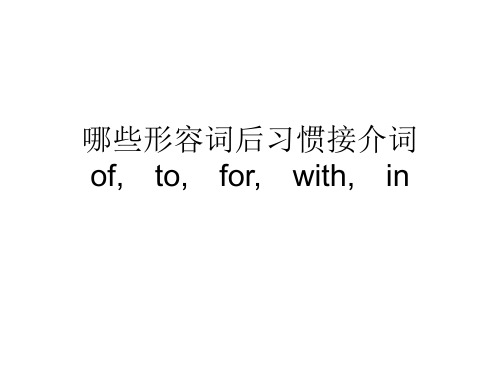
• 16)表示“厌恶”、“讨厌”、“反感”的形容词
– Abominable可恶的; antipathetic厌恶的; offensive令人讨厌的; repellent令
• 17)表示“相同”、“相等”、“相似”、“不相似”的形容词
– Analogous相似的; comparable相等的; dissimilar不相似的; similar相似的; equivalent相等的; …
• 2)表示“反对”、“反抗”、“对抗”、“对立”、“相反”、 “矛盾”的形容词
– Antipodal恰好相反的; antithetic对立的; contradictory矛盾的; contrary相反 的; cross相反的; objectionable反对的; resistant对抗的;…
• 3)表示“友好”、“不友好”、“敌对”、“好客”、“不好 客”、“热情”、“冷漠”的形容词
– Adverse不友好的; courteous有礼貌的; disrespectful无理的; respectful尊 敬别人的; friendly友好的; unfriendly不友好的; hospitable好客的; inhospitable不好客的; hostile有敌意的; impolite无礼貌的; polite有礼貌的; indifferent冷漠的; uncivil失礼的; uncourteous无理的; …
• 13)表示“典型”、“不典型”、“有特点”、“无特点”的形 容词
– Atypical不典型的; typical典型的; characteristic有特点的; uncharacteristic 无特点的;…
• 14)表示“产生”、“引起”的形容词
– Creative产生的; fertile多产的; productive产生的; provocative引起的;…
现在进行时的习惯用法有哪些

现在进行时的习惯用法有哪些现在进行时是英语语法中的一个重要时态,它不仅用于表示正在进行的动作,还有一些独特的习惯用法。
接下来,让我们一起深入探讨一下现在进行时的这些习惯用法。
一、表示现阶段正在进行的动作,但不一定是说话时正在进行这种用法强调的是当前这段时间内正在发生的动作,但在说话的那一刻,动作不一定正在进行。
例如:“I'm studying English these days”(我这些天在学英语。
)这里说的“学英语”不是指此刻正在学,而是指这一段时间内都在进行这个学习活动。
二、表示即将发生的动作,常与表示将来的时间状语连用当现在进行时与一些表示即将发生的时间状语,如“soon”(不久)、“tomorrow”(明天)、“next week”(下周)等连用时,它可以表示将来要发生的动作。
比如:“I'm leaving for Beijing tomorrow”(我明天要去北京。
)“They're coming here soon”(他们很快就来这儿。
)三、表示反复发生的动作,常带有感情色彩在某些情况下,现在进行时可以用来表示反复发生的动作,这种用法往往带有不满、厌烦、赞美等感情色彩。
例如:“He is always borrowing money from me”(他老是向我借钱。
)这里用现在进行时“is always borrowing”表达了说话人对对方频繁借钱这一行为的不满。
再比如:“She is constantly helping others”(她总是在帮助别人。
)则传达了对她乐于助人这一品质的赞美。
四、与副词“always”“constantly”“forever”等连用,表示抱怨、厌烦、赞美等当现在进行时与“always”“constantly”“forever”这类副词连用时,所表达的情感色彩会更加明显。
比如:“You are always making mistakes”(你总是犯错。
living habits做主语,谓语动词用

当“living habits”(生活习惯)作主语时,谓语动词的使用取决于句子的语境和表达的意思。
一般来说,以下几种情况比较常见:
1. 一般现在时:如果描述的是一般性的事实或习惯,可以使用一般现在时的谓语动词。
例如:Living habits vary from person to person.(生活习惯因人而异。
)或者 Our living habits determine our health.(我们的生活习惯决定我们的健康。
)
2. 一般过去时:如果讲述的是过去的生活习惯,可以使用一般过去时的谓语动词。
例如:His living habits changed after he retired.(他退休后生活习惯改变了。
)
3. 现在进行时:如果强调正在进行的生活习惯,可以使用现在进行时的谓语动词。
例如:She is trying to change her living habits.(她正在努力改变自己的生活习惯。
)
4. 将来时:如果涉及到未来的生活习惯,可以使用将来时的谓语动词。
例如:They will adopt healthier living habits in the future.(他们将来会养成更健康的生活习惯。
)。
情态动词CAN的一些习惯用法-英语学习辅导

一、cann ot …t oo… "不可能把某事做过头;决不会…太",与ca n nev er…to o同义。
e.g. Onecanno t betoo m uch c arefu l. "越小心越好。
"二、canno t but + 动词原形,ca nnothelpbut +动词原形,cann ot he lp +动名词,这三个短语在意义上基本相同,都表示"禁不住,不由得,不得不,不能不"的意思。
can not h elp +动名词,是最规范的用法,最为常见。
e.g.I can not h elp a dmiri ng th e pic turewhene ver I look at i t. "不管什么时候看到这幅画,我都禁不住要赞赏它。
""canno t but + 动词原形"主要用于美国英语,用法不大规范。
e.g. When thecount ry ca lls y ou fo r hel p, yo u can not b ut go. "当国家需要你的时候,你不能不挺身而出。
""cann ot he lp bu t + 动词原形",这种用法多见于非正式文体。
e.g. Youcanno t hel p but resp ect t hem."你禁不住会尊敬他们。
"三、canbut +动词原形,cann ot bu t + 动词原形意思不同,但又不能把后者简单地理解为前者的否定。
can but+ 动词原形 = c an on ly。
与颜色相关的英语短语和习惯用法
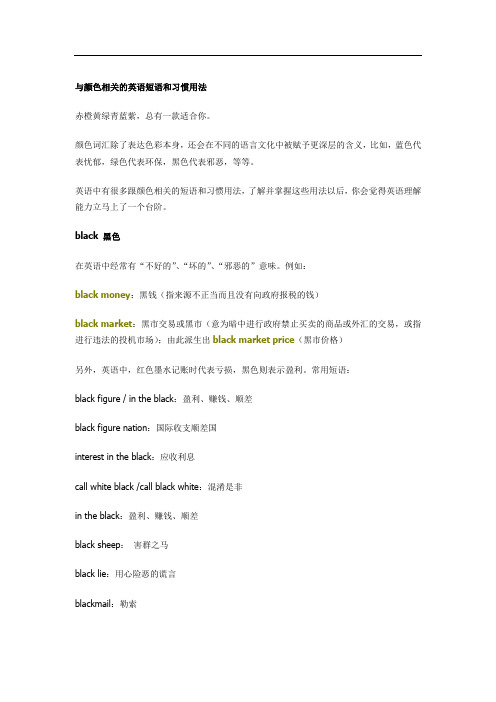
与颜色相关的英语短语和习惯用法赤橙黄绿青蓝紫,总有一款适合你。
颜色词汇除了表达色彩本身,还会在不同的语言文化中被赋予更深层的含义,比如,蓝色代表忧郁,绿色代表环保,黑色代表邪恶,等等。
英语中有很多跟颜色相关的短语和习惯用法,了解并掌握这些用法以后,你会觉得英语理解能力立马上了一个台阶。
black 黑色在英语中经常有“不好的”、“坏的”、“邪恶的”意味。
例如:black money:黑钱(指来源不正当而且没有向政府报税的钱)black market:黑市交易或黑市(意为暗中进行政府禁止买卖的商品或外汇的交易,或指进行违法的投机市场);由此派生出black market price(黑市价格)另外,英语中,红色墨水记账时代表亏损,黑色则表示盈利。
常用短语:black figure / in the black:盈利、赚钱、顺差black figure nation:国际收支顺差国interest in the black:应收利息call white black /call black white:混淆是非in the black:盈利、赚钱、顺差black sheep:害群之马black lie:用心险恶的谎言blackmail:勒索the pot calls the kettle black:五十步笑百步black dog:忘恩负义的人black hat:坏人black letter day:倒霉的一天black-out:暂时性记忆丧失;昏迷;停电black and blue:遍体鳞伤brown 棕色常用短语:brown bread:黑面包brown polish:黑白混血儿brown rice:糙米brown sugar:红糖brown paper:牛皮纸brown-bag:带午餐上班或上学brown nose:献殷勤,拍马屁to do sb. brown:使某人上当the brown:黑压压的一群飞鸟to do it up brown:把什么彻底搞好a brownstone district:富人居住区与棕色有关的社会内涵a. 英语动词短语to be browned off不满意,生气的意思。
高中英语习惯用法汇总

由顾燕卿上传高中英语习习用法汇总1. It ’ s the first time that.()It was for the first time that ( for the first time)It ’ s (high) time that..(should do)2.It ’ s the same with sb. / Soitis with sb.3. be about to do / be doing when / . .4 A is twice / three times as + +as B Ais twice / three times the n. of B.A is twice / three times ++than B5.It ’ s a waste of time / money doing / to doIt ’ s no use / good doingIt ’ s possible / probable / (un) likely that .It makes great / no sense to do/6.There ’ s no use / good doing .There ’ s no sense / point (in) doingThere is no need for sth. / to do .There is (no) possibility that7.The+.., the+.., .8.It seems / appears ( to sb. ) that sb ....= Sb. seems / appears to be / to do / to be doing / to have doneIt seems / looks as if/ . ..9.It (so) happened that sb.....= Sb. happened to be / to do / to be doing / to have done..10.It is said / thought / believed / hoped / supposed.that sb=Sb. is said to be / to do / to be doing / to have done.(hope hope sb. to do)12.such.that . ..such..as .. (as )13. Do you mind if I do sth.?/ Would you mind if I did sth.?14. The chance is that../ (The )Chances are that. .15.Check / Make sure / See to it / See that..()/..16.depend on it that..see to it that/. .except / but / inthat it17It is / was +///+thatHow / When / Where / Why is / was it that..?who18.How is it that..“.? ”“”How come+How does / did sth. come about? ( How did it come about that).?:How come you are late again?19.There seems / appears / happens to be / must be / can’ t be / is (are, was, weresaid to be / is (are, was, were) thought to be .“ . / / / / / ..”of there beingwant / wish / expect there to be / / ..adj. / adv. enough for there to be . . there being / there to be there beIt is said / thought thatthere is / are=There is / was / are / were said (thought) to be . I have never dream of there being such a good chance for me.It won ’ t be cold enough for there to be a frost tonight.20. ++ Who do you think he ’ ll have attend the meeting? 21. But for + n. / pron., sb. / sth. would (not) have done ...,( )=If it had not been for .., ./If there had not been., .. / . 22. It won( ’ t) be longforebe +It was (not) long before+ /.. 23. Those who.( ).)Anyone who= Whoever..( 24 . ...when .(might / should do might / should have done) ” ”, “ ( ) ”, , , :Why are you here when you should be in school?? He stopped trying when he might have succeeded . . 25. There is ./ Sb. have no doubt that ( ,that )There is / Sb. have some doubt whether ..(if) Sb. doubt if / whether . 26Sb. don ’ t doubt that . immediately / directly / instantly / the moment + on / upon + n. / doing .( )No sooner had sb. done thanHardly had sb. done when ..( )“ . ”27. every time / each time / the last time / the first time / next time +anywhere / everywhere + whereverYou can go anywhere you like. Next time you come, please bring your son along. 28.If only / I wish + ( ) , “ . ” “ ! ” 29 .Considering + n. pron. that / Seeing that . / . Given + n. / pron , “ ” “ ” “ ”, ” ”Seeing (that) he refused to help us, there is no reason why we should help him now.Given good health, I hope to finish the work this year. Given their inexperience / that they are inexperienced, they ’ ve done a good 30.There was a time when . . 31.other than no, not, none , , : It was none other than Mr. Smith. Smith . 32. Not until .did / do/ does / will sb. do It was / is not until that sb 33.It ’ s (un) like sb. to do / to have done / 34.It remains to be seen Wh-- words .. . .( that, if )35.It only remains for sb. to do .We’ ve got everything ready. It only remains for you to come to dinner.36.One moment., and now方才一会儿还在做而此刻却..37.Not all / both / everyone表示部分否认38. Such is / are这(些.. )就是.(谓语动词单复数由后边名词决定)39.I ’ d rather (not) do / have done我情愿..I’ d rather从+句(从句顶用过去时或过去达成时)40. It ’importants / necessary / strange / surprising .+that (用陈说语气或 should do)41. I like / hate / appreciate it that / when 等从句(it 表示后边从句的这类状况 ) Iappreciate it if you will give me a hand.42.By the time +从句(一般此刻时 /过去时),主句(未来达成时 /过去达成时)43., as is often the case with sb. / as is usual with sb.(as指引非限制性定语从句)44 in case / lest / for fear that从句顶用陈说语.(气或should do)45.While 置于句首可表示As long as 或 AlthoughWhile there is life there is hope.While I admit his good points, I can see his bad ones.46.can not ( never)too +adj. (adv. ) / adj. (adv.) + enough越越好”“特别“”too + adj. ( anxious / eager / willing / ready / glad 等 )+to do .表示一定意思 Ican ’ t thank you enough我非.常感谢你 .He was too glad to see his father.=He was very glad to see his father.47.not / neve 等表示否认的词与比较级连用表示最高等,如:-----Do you agree with his suggestion? ------- I can ’ t agree more.48.What if 假如.. .怎么办?What if he doesn t come’ tomorrow?49.more..than与其 .不如 .. He is morenervous than frightened.50. It is / has been + 一段时间 +since 从句 (从句中如为持续性动词,则实质表示的意思相反 )It is two years since he drank.他不饮酒已两年.了【各个击破】1. Mr. Smith didn’ t understand ______ made his son so upsetmorningthis.A. what was itB. why it was thisC. how that wasD. what it was that2.-----Did you have a good sleep last night?----Yes, never sleep _______.A. badlyB. betterC. worseD. best3. We are only _____ glad to do anything we can _______ her.A. too; to helpB. very; help C too; help D. very; helping4.-----How come you are late for class again?-------_____________.A. Because I missed the busB. By bus and then on footC.Please excuse me D. It ’ s quite wrong 5. _______morethan 3,000 languages in the world. A. There are thoughtto be B. There is thought to be C. They are thought to beD. It is thought to be6.-----George is a wise person.-----But in my opinion, he is ______ than wise.7.-----So can I ask you a few fairly straightforward questions about yourself?-----No problem. I like ________ when people are open and direct.A. thatB. thisC. itD. them8. ----______I move the picture over here?----I suppose it’ ll lookerbett.A. How ifB. What aboutC. How aboutD. What if9. China has produced ______ this year as it did in 2002.A. as twice much steelB. twice steel as muchC. twice as much steelD. as much steel twice10.-----_______was it ______ you discovered the secret of his?------Totally by chance.C. What; whenD. How; thatA. How; whenB. What; that11.-----Who on earth could it be?------It was _______ other than Clint Eastwood.A. noneB. nothingC. notD. nobody12._____his age, he did it quite well, so don’ t ______ him any more.A Given; blame B. Considered; say C. To regard; scold D. Considering; speak13.No sooner _____ themselves in their seats in the theatre ______ the curtain went up.A. they have settled; beforeB. had they settled; thanC.have they settled; when D. they had settled; than14.-----Did you meet with the famous space hero, Yang Liwei?------______I had come here earlier!A. If onlyB. If notC. But forD. For fear15.The students expected __________ more reviewing classes before the final exams.A. it would beB. there beingC. it to beD. there to be16.Students shouldn’ t be given so difficult a problem _____ they can not work out.A. thatB. whichC. whileD. as17. It was twelve o’ clockmidnightat _______ they arrived at a lonely village.A. thatB. beforeC. sinceD. when18.----- The exam wasn ’ t difficult, was it?------ No, but I don’ t think ______could pass it.A. somebodyB. anybodyC. everybodyD. nobody19.-----I always take care when doing papers on the computer.-----You meant it! One can not be_______careful working on it.A. tooB. veryC. soD. quite20.-----Is Miss White working these days?------No. It is two months since she worked here.------Oh,_____________?A. where is she working nowB. would you please show me the wayC. which is her officeD. is she ill。
英语中的固定搭配和习惯用法总结

英语中的固定搭配和习惯用法总结
1.固定搭配(ms and ns)
固定搭配是指在英语中频繁使用的一些固定组合的词汇,其意义往往不能从单个单词的意思推测出来。
以下是一些常见的英语固定搭配:
to kick the ___:去世
to break the ice:打破僵局
___:泄露秘密
to hit the nail on the head:一针见血
___:开夜车
2.惯用法(matic Usage)
惯用法是指在英语中惯常使用的表达方式,它们的用法可能有些特殊,需要掌握固定的词序或句型。
以下是一些常见的英语惯用法:
to make a difference:产生影响
to take a back seat:退居次要地位
to give ___:帮助某人
to keep an eye on:密切关注
to play it by ear:随机应变
3.练建议(Practice Tips)
要提高对固定搭配和惯用法的掌握,可以采取以下方法:
阅读英语文章和书籍,特别关注其中常用的固定搭配和惯用法;
练使用固定搭配和惯用法来表达自己的想法,写作时尽量使用
这些表达方式;
参加英语口语角或者与他人进行英语对话时,积极运用这些固
定搭配和惯用法。
希望以上总结对您研究和使用英语中的固定搭配和惯用法有所
帮助!。
tradition和traditional用法

tradition和traditional用法在英语中,tradition和traditional是两个常用的词汇,它们都与传统有关,但在用法上存在一些细微的区别。
本文将详细介绍这两个词的用法,帮助读者更好地理解和使用它们。
一、tradition的用法1.1定义和含义tradition在英语中指的是世代相传的习惯、信仰、价值观等,通常被视为一种传统或文化传承。
它可以指具体的传统,如某个地区的风俗习惯,也可以指抽象的传统,如某个时代的精神风貌。
1.2常见搭配tradition常用以下搭配:*tellatradition(讲述传统)*upholdtradition(维护传统)*breakwithtradition(与传统决裂)*followone'sowntradition(遵循自己的传统)*breaknewgroundintradition(在传统中开辟新领域)1.3注意事项在使用tradition时,需要注意以下几点:*它通常用于描述长期存在、具有一定历史渊源的传统,而非短暂出现或临时形成的习俗。
*在强调传统的重要性和影响力时,可以与spirit、value等词语搭配使用。
二、traditional的用法2.1定义和含义traditional在英语中意为“传统的、惯例的”,通常用于描述符合传统习惯或习俗的事物。
它可以指具体的事物,如传统的服装、饮食、建筑等,也可以指抽象的概念,如传统观念、思维方式等。
2.2常见搭配traditional常用以下搭配:*be/keep/adheretotraditional(遵守传统)*break/discardtraditional(摒弃传统)*traditionalvalues(传统价值观)*traditionalculture(传统文化)*traditionalartforms(传统艺术形式)2.3注意事项在使用traditional时,需要注意以下几点:*它通常用于描述符合传统习惯或习俗的事物,而非短暂出现或临时形成的事物。
英语八大时态总结
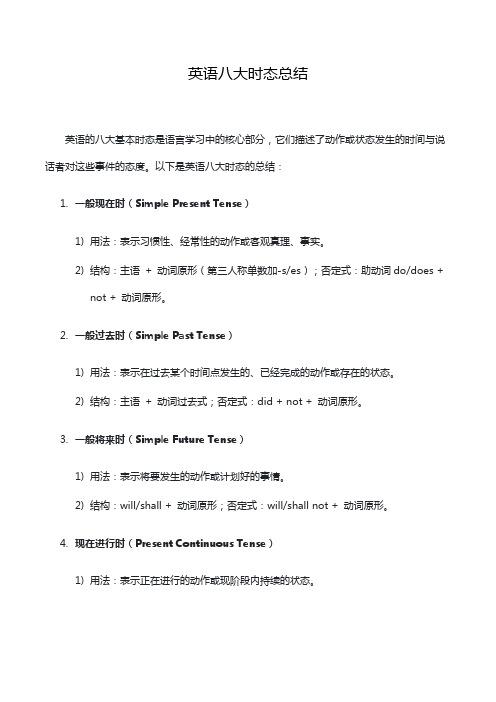
英语八大时态总结英语的八大基本时态是语言学习中的核心部分,它们描述了动作或状态发生的时间与说话者对这些事件的态度。
以下是英语八大时态的总结:1.一般现在时(Simple Present Tense)1)用法:表示习惯性、经常性的动作或客观真理、事实。
2)结构:主语+ 动词原形(第三人称单数加-s/es);否定式:助动词do/does +not + 动词原形。
2.一般过去时(Simple Past Tense)1)用法:表示在过去某个时间点发生的、已经完成的动作或存在的状态。
2)结构:主语+ 动词过去式;否定式:did + not + 动词原形。
3.一般将来时(Simple Future Tense)1)用法:表示将要发生的动作或计划好的事情。
2)结构:will/shall + 动词原形;否定式:will/shall not + 动词原形。
4.现在进行时(Present Continuous Tense)1)用法:表示正在进行的动作或现阶段内持续的状态。
2)结构:am/is/are + 动词-ing形式;否定式:am/is/are + not + 动词-ing形式。
5.过去进行时(Past Continuous Tense)1)用法:表示过去某段时间内正在进行的动作或背景。
2)结构:was/were + 动词-ing形式;否定式:was/were + not + 动词-ing形式。
6.现在完成时(Present Perfect Tense)1)用法:表示过去发生的动作对现在的影响或从过去一直持续到现在的情况。
2)结构:have/has + 过去分词;否定式:have/has + not + 过去分词。
7.过去完成时(Past Perfect Tense)1)用法:表示在过去的某一时间之前已经完成的动作。
2)结构:had + 过去分词;否定式:had + not + 过去分词。
8.将来完成时(Future Perfect Tense)1)用法:表示在将来某一时刻之前将要完成的动作。
英语中asleep的习惯用法

英语中asleep的习惯用法
一、习惯上只用作表语
是表语形容词,所以一般不能单独放在名词前作定语:
正:The baby is asleep. 这婴儿是睡着的。
误:Look at the asleep baby.
正:Look at the sleeping baby. 瞧这个睡觉的婴儿。
注:asleep 虽不能单独放在名词前作前位定语,但有时却可放在名词后作后置定语,另外若它本身受到状语修饰,则也可以放在名词前作定语。
如:
Who is that fast asleep boy? 那个熟睡的孩子是谁?
The boy asleep over there is my nephew. 睡在那儿的那个孩子是我侄儿。
二、习惯搭配问题
汉语的“睡得很熟”,英语习惯上用fast [sound] asleep, 而不说very (much, very much) asleep。
如:
You will be fast [sound] asleep by the time we get home. 等我们到家时,你会睡得很熟了。
Don’t wake her up —she is fast [sound] asleep. 别吵醒她,她睡得正香。
三、惯用习语
fall asleep 是习语,意为“入睡”。
如:
She fell asleep during the meeting. 开会时她睡着了。
He fell asleep (while) watching TV. 他在看电视时睡着了。
特殊及习惯英语用法
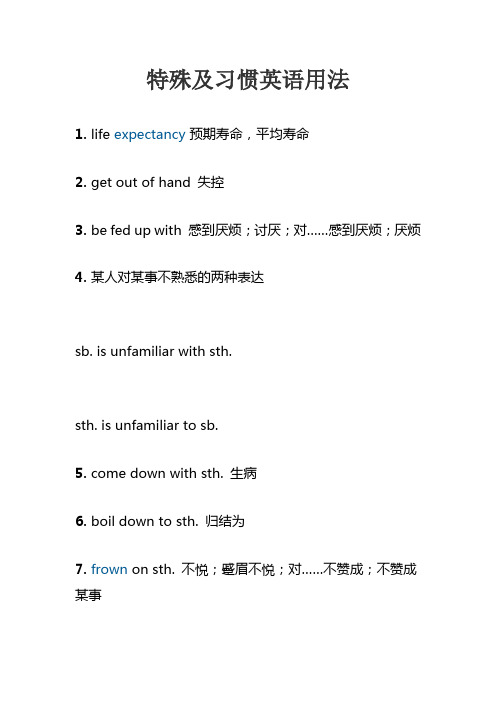
特殊及习惯英语用法
1. life expectancy预期寿命,平均寿命
2. get out of hand 失控
3. be fed up with 感到厌烦;讨厌;对……感到厌烦;厌烦
4. 某人对某事不熟悉的两种表达
sb. is unfamiliar with sth.
sth. is unfamiliar to sb.
5. come down with sth. 生病
6. boil down to sth. 归结为
7. frown on sth. 不悦;蹙眉不悦;对……不赞成;不赞成某事
8. do nothing but do 固定用法
9. in honor of sb./sth. 纪念某人/某事
10. There’s no point in doing sth. 做某事无意义
11. nothing but 只有;只不过anything but 根本不;除…以外任何事
12. rarely, seldom, hardly, scarcely
Rarely和seldom意思都是“很少”(表频率),seldom 更正式、更书面。
Hardly和scarcely意思都是“几乎不”或者“刚刚”(表程度)。
相比之下scarcely更正式、更书面。
People rarely ask questions.
She was seldom seen in public.
I hardly had time to ask her name.
We had scarcely arrived when he asked us to leave.。
英语重点词汇语法详解make a habit of用法

英语重点词汇语法详解make a habit of用法make/ develop/form a habit of 做某事成了习惯;养成了做某事的习惯"The successful person makes a habit of doing what the failing person doesn't like to do."--Thomas Edison“成功的人养成了做失败者不愿干的事的习惯。
”——托马斯·爱迪生You'd better not make a habit of staying up late.你最好不要养成熬夜的习惯。
They make a habit of giving “no”as their answer.他们习惯于用“不”作为他们的答案。
Successful people make a habit of being a skeptic. They ask themselves over and over “why?”成功的人都有怀疑的习惯。
他们一遍又一遍地问自己“为什么?”They make a habit of going against the current.他们养成逆水行舟的习惯。
T hey make a habit of laughing at themselves.他们养成了自嘲的习惯。
They make a habit of listening to the world around them.他们养成了倾听周围世界的习惯。
They make a habit of teaching others.他们养成了教别人的习惯。
Don't make a habit of it.别养成习惯。
I'd prefer you not to make a habit of it.我希望你不要习以为常。
You can phone me at work as long as you don't make a habit of it.你可以上班时给我打电话,只要别一来二去打上瘾了就成。
英语语态的一些习惯用法
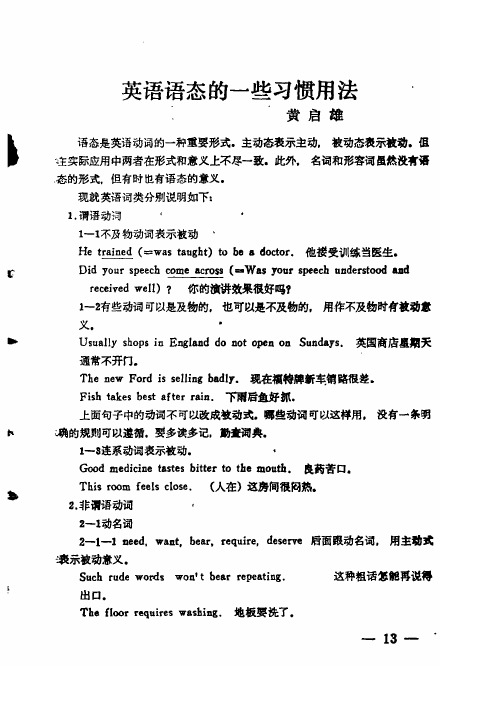
x 沁r i 比a t l g
l
, , 朴 种 t
. o
r d. i
”
9
.
那 个可 怜姑娘的
苦难无 法再忍受下去
2一 2不定式
2 一 2一 1主动式不定式表示被动
.
1 口 f o
e T五
l b
a
m a
n ,
e
o f
a r e
r
t i
.
这件李怪我
t
。
r e
o s
n o
f
a r
t
o
e s
e
k
一
理 由不难找到 扫
o i
n a
te
t卜 m
中的
。
.
Fi h ta k
s
t b s
e
ft
e r
ai
下雨 后鱼好 抓
, .
上面 句子 中的动词 不 可 以改成被动式
哪些动词 可 以这样用
.
没 有一 条明
确 的规则可 以遵 循
G o d 也e di e i n
5 T五 王
r
.
要多读多记
。
角立词典
1一 8 连系动词表示被动
e
t a ls
e
s
e t
s
bi t t e
。
2一 2一 2不 定式 跟它修饰的词 有动宾关系
句 中还 有别的词 可能 是 做 这个 动
作的主事人 时 e 二 恤v
: 少 加
,
用主动式表示被动习 r k o
,
竺丝 `
e
我有工 作做
“
.
t ` 。二 e
2019年初中英语语法:冠词the的习惯用法
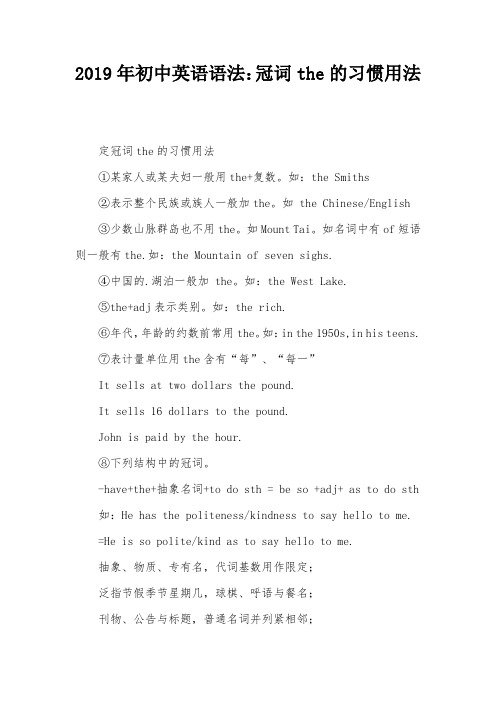
2019年初中英语语法:冠词the的习惯用法
定冠词the的习惯用法
①某家人或某夫妇一般用the+复数。
如:the Smiths
②表示整个民族或族人一般加the。
如 the Chinese/English
③少数山脉群岛也不用the。
如Mount Tai。
如名词中有of短语则一般有the.如:the Mountain of seven sighs.
④中国的.湖泊一般加 the。
如:the West Lake.
⑤t he+adj表示类别。
如:the rich.
⑥年代,年龄的约数前常用the。
如:in the 1950s,in his teens.
⑦表计量单位用the含有“每”、“每一”
It sells at two dollars the pound.
It sells 16 dollars to the pound.
John is paid by the hour.
⑧下列结构中的冠词。
-have+the+抽象名词+to do sth = be so +adj+ as to do sth 如:He has the politeness/kindness to say hello to me. =He is so polite/kind as to say hello to me.
抽象、物质、专有名,代词基数用作限定;
泛指节假季节星期几,球棋、呼语与餐名;
刊物、公告与标题,普通名词并列紧相邻;
唯一职位,学科与语种,洲、国、省、市、县街路名。
英语语法与惯用法知识点总结
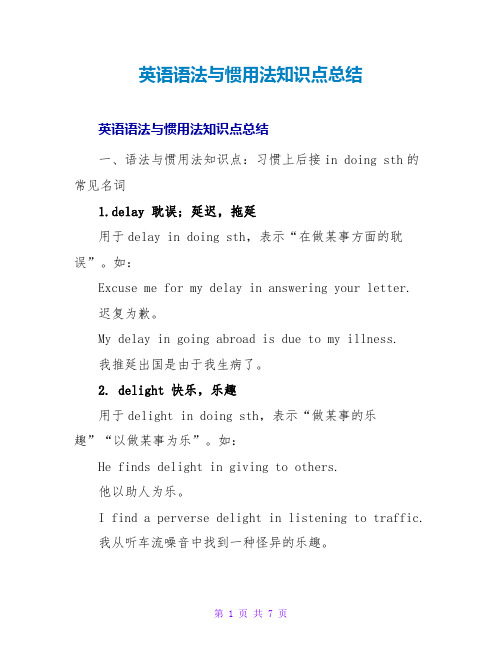
英语语法与惯用法知识点总结英语语法与惯用法知识点总结一、语法与惯用法知识点:习惯上后接in doing sth的常见名词1.delay 耽误; 延迟,拖延用于delay in doing sth,表示“在做某事方面的耽误”。
如:Excuse me for my delay in answering your letter.迟复为歉。
My delay in going abroad is due to my illness.我推延出国是由于我生病了。
2. delight 快乐,乐趣用于delight in doing sth,表示“做某事的乐趣”“以做某事为乐”。
如:He finds delight in giving to others.他以助人为乐。
I find a perverse delight in listening to traffic.我从听车流噪音中找到一种怪异的乐趣。
注意有用构造take delight in doing sth(喜欢做某事,从做某事中取乐)。
如:She took delight in teasing me.她老爱跟我开玩笑。
Now many people take delight in watching TV.如今许多人都喜欢看电视。
He takes great delight in proving others wrong.他的极大乐趣是证实别人错了。
3. harm 危害用于 harm in doing sth,表示“做某事的危害”,尤其用于no harm in doing sth构造。
如:What’s the harm in having a little fun?开点玩笑有什么不好?He may not be abl e to help but there’s no harm in asking him.他可能帮不了忙,但是求他一下倒也无妨。
The problem may not arise, but there’s no harm in keeping our powder dry.问题不一定会发生,但有备无患并无害处。
英语单词惯用法(49)

英语单词惯用法(49)英语中有些形容词常作表语,习惯上后接介词,构成:主语+ be +adj + 介词+ (doing) sth句型。
同一个形容词后接不同的介词,意思也就不同。
下面就这些词的用法加以归纳,并配以练习进行巩固。
1、①be afraid for sb/ sth 为…担心例句:He is afraid for himself. 他总是提心吊胆的。
①be afraid of sb/ sth 害怕…例句:The little girl is afraid of that policeman. 那小女孩怕那个警察。
2、①be angry with sb 对某人生气例句:I am angry with you for your conduct. 你的行为使我生气。
①be angry about sth 对或因某事生气例句:She often got angry about many foolish things. 她常为许多蠢事而生气。
①be angry at sth 例句:We were angry at the boys for their tardiness. 我们对那些男孩行动迟缓很生气。
①be angry for sth 例句:He is angry for trifles. 他为一些琐事而生气。
①be angry over sth 例句:Don't be angry over such trivial matters. 别为这些琐事生气。
3、①be anxious about sth 为…焦虑例句:I'm very anxious about the speech contest. 我对此次演讲比赛十分忧虑。
①be anxious at sth为…焦虑例句:They became anxious at her delay. 他们对她的耽搁渐渐感到不安了。
①be anxious for sth/ sb为…焦虑例句:He was anxious for the safety of his money. 他替他的钱的安全担心。
nose 英语中和鼻子“nose”有关的习惯用法
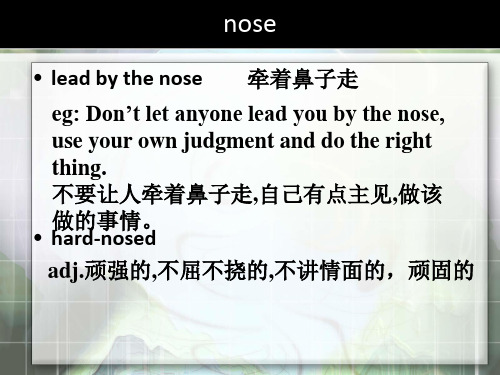
nose
• keep one’s nose to the grindstone 连续辛勤地工作 eg: These years those who’re keeping their nose to the grindstone can’t make bundles. 这年头,只会埋头苦干的人是挣不了什么大 钱的。
nose
• pay through the nose 付出比真正的价值高得多的钱,也可以说是 付出的钱实在太多而让人感到心痛。 eg: My brother Bob borrowed the money to open his restaurant five years ago when the interest rate was very high, so he’s been paying through the nose ever since. 我哥哥鲍伯五年前借钱开饭馆的时候正好 利率非常高,所以,他从那时起就一直在大笔 大笔地还债。
• nose around / about 找寻,打听(别人的事) eg: We found a man nosing around in our backyard. 我们发现有个人在我们后院里找什么东 西。 好管闲事的,爱打听的 • nosy eg: Don’t be so nosy —it’s none of your business. 别管那么多闲事——这与你无关。
• look down one’s nose at 对……不屑一顾,蔑视 He looks down his nose at poor people. 他看不起穷人。
• turn up one’s nose at • 看不上,觉得不屑于 • When I gave her the present, she turned up her nose at it. • 当我把礼物给她时,她很不屑。
英语单词惯用法(6)

英语单词惯用法(6)下面这些动词和短语习惯上后接“to+动名词”,形成固定的句式。
下面就这些动词和短语的用法加以归纳,并配以练习进行巩固。
1、adapt to doing sth 适应做某事例句:He has adapted to doing that work. 他已经适应做那件工作。
2、admit to doing sth承认做了某事例句:George would never admit to being wrong. 乔治从不认错。
3、amount 意思是做某事,等同于做某事例句:Borrowing money and not returning it amounts to stealing. 借了钱不还就等于偷。
4、apply oneself to doing sth专心致力于做某事例句:They applied themselves to producing bikes. 他们努力生产自行车。
5、apply to doing sth适用于做某事例句:These principles apply to learning maths. 这些原则适用于数学学习。
6、pay attention to doing sth注意做某事例句:Our teachers always pay attention to combining theory with practice. 我们的老师总是注意理论联系实际。
7、contribute to doing sth 促成/有助于做某事例句:Laissez-faire policy result in increase economic activity, but contribute to rising in import. 自由放任政策导致经济活动的增加,但也促进了进口的增长。
8、descend to doing sth 转而提到/堕落到做某事例句:All too soon they will descend to spreading scandal and gossip. 过不了多久他们就会堕落到传播丑闻和谣言的地步。
英语中用法总结(必备3篇)
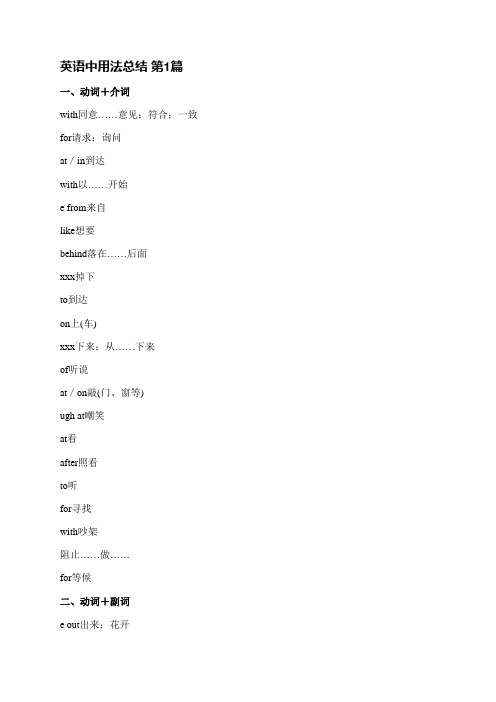
英语中用法总结第1篇一、动词+介词with同意……意见;符合;一致for请求;询问at/in到达with以……开始e from来自like想要behind落在……后面xxx掉下to到达on上(车)xxx下来;从……下来of听说at/on敲(门、窗等)ugh at嘲笑at看after照看to听for寻找with吵架阻止……做……for等候二、动词+副词e out出来;花开e over顺便来访;过来e along来;随同e in进来up吃光down倒下;跌倒out找出;查明back回去on继续out外出back回来;取回up长大;成长up起床home回家up赶快on不挂断;等一等out留神;注意over检查up向上看;查阅away搬走on穿上;上演on传递away逃跑up打电话xxx出发;动身out乱丢;抛散on打开xxx关out取出over绊倒把……翻过来down写下;记下up醒来out算出;解出三、动词+副词+介词fed up with厌倦up with赶上on with继续on with与……相处from把……从……中拉出来四、动词+名词+介词care of照料;照顾room for给……腾出地方friends with与……交朋友a joke on戏弄某人a look at看一看a drink of喝一点goodbye to告别;告辞五、动词+形容词+介词late for迟到angry with生气busy with忙于short for是……的简称interested in对……感兴趣famous for因……而著名good at擅长different from与……不同good/bad for对……有益/害friendly to对……友好英语中用法总结第2篇于考研英语难说,在语法的构造上有其自身的特点,实际上在很大程度上就是对长、难句的理解,所以语法的学习要和长、难句的理解相互结合起来。
- 1、下载文档前请自行甄别文档内容的完整性,平台不提供额外的编辑、内容补充、找答案等附加服务。
- 2、"仅部分预览"的文档,不可在线预览部分如存在完整性等问题,可反馈申请退款(可完整预览的文档不适用该条件!)。
- 3、如文档侵犯您的权益,请联系客服反馈,我们会尽快为您处理(人工客服工作时间:9:00-18:30)。
1.I wasn't born yesterday.(我又不是三岁小孩)2.How do I address you?(我怎么称呼你)3.She turns me off.(她使我厌烦。
)4.So far so good.(目前为止,一切都好。
)5.Be my guest.(请便、别客气)6.That was a close call.(太危险了/千钧一发)7.Far from it.(一点也不。
)8.It's a pain in the neck[麻烦的事(人)].(那真是件麻烦事)9.We're in the same boat.(我们处境相同。
)10.My mouth is watering.(我在流口水了。
)11.I ache all over.(我浑身酸痛。
)12.I have a runny nose.(我流鼻涕。
)13.Do you have any openings?(你们有空缺吗?)14.Think nothing of it.(别放在心上。
)15.I'm not myself today.(我今天心神不宁。
)16.I have a sweet tooth.(我喜欢吃甜食。
)17.For the time being.(暂时;暂且;目前)18.Don't beat around the bush. (别拐弯抹角了。
)19.It's up on the air[悬而未决].(尚未确定。
)20.It slipped my mind.(我忘了。
)21.You can't please[使人感到满意和愉快] everyone.(你不可能讨好每一个人。
)22.I'm working on[着手;从事] it.(我正在努力。
)23.You bet!(当然!)24.Drop me a line[短信].(写封信给我)25.Are you pulling my leg[同某人开玩笑;取笑]?(你在开我玩笑吗?)26.I'll keep my ears open.(我会留意的。
)27.Neck and neck.(不分上下。
)28.I'm feeling under the weather.(我觉得不舒服/精神不好/情绪低落。
)29.Don't get me wrong[误解].(不要误会我。
)30.You're the boss.(听你的。
)31.If I were in your shoes[处在某人的位置].(如果我是你的话。
)32.Over my dead body!(休想)33.It'll come to me.(我会想起来的。
)34.I will play it by ear[见机行事;临时现做].(我会见机行事的;到时候再说。
)35.Let's talk over coffee.(我们边喝边谈。
)36.Take it easy.(轻松一点;别紧张;放松放松;再见。
)[这是美国人最喜欢说的话,也可作离别用语。
}37.Let's give him a big hand.(让我们热烈鼓掌。
)38.As far as I'm concerned.(就我而言。
)39.I'm up to my ears[忙得不可开交;深陷于某事物中] in wor k.(我忙死了。
)40.You can't do this to me.(你不能这么对我。
)41.Just to be on the safe side. (为了安全起见。
)42.It's been a long time.(好久不见了。
)43.It's about time.(时间差不多了。
)44.I can't imagine why.(我想不通为什么。
)45.That's really something.(真了不起。
)46.Excuse me for a moment.(失陪一会儿。
)47.I'm dying[很想] to see you.(我真想见你。
)48.I'm flattered.(过奖了。
)49.You can never tell.(不知道/谁也没把握。
)50.I won't buy[相信;接受] you story.(我不信你那一套。
)51.It hurts like hell!(疼死啦!)52.It can't be helped.(无能为力。
)53.Sorry to bother you.(抱歉打扰你。
[事前])Sorry to have bothered you.(抱歉打扰你。
[事后])54.Stay out of this matter, please.(请别管这事。
)55.I'll make it up to you.(我会赔偿的。
)56.I'm very / really / terribly / awfully / extremely sorry.(十分抱歉)57.Let's forgive and forget.(让我们摈弃前嫌。
)58.I've heard so much about you!(久仰大名!)58.Don't underestimate me.(别小看我。
)59.She gives me a headache.(她让我头疼。
)60.You're wasting you breath.(你在白费口舌)61.Don't get on my nerves!(不要搅得我心烦。
)62.His argument doesn't hold water.(他的论点站不住脚) 63.You've got to do something.(你一定要想办法。
)64.Don't look wise.(别自作聪明)65.You're going too far!(你太过分了!)66.Don't bury your head in the sand.(不要逃避现实。
)67.Nothing works.(什么都不对劲儿。
)68.Money will come and go.(钱乃身外之物。
)69.He's been behind bars for almost 30 years.(他坐了将近3 0年牢。
)70.You have my word.(我保证。
)71.He hit the ceiling at the news.(他听到那消息暴跳如雷/大发雷霆)72.You're too outspoken.(你太直率了。
)73.Every dog has his day.(凡人皆有得意时。
)74.Are you out of you mind?(你疯了吗?)75.He's been everywhere.(他到处都去过了。
)76.Who is to blame?(该怪谁?)77.There're a lot of rumors going around.(很多流言流传着。
)78.I don't feel up to that.(我觉得不能胜任那工作。
)79.I'm mad at myself.(我生自己的气。
)80.It's raining cats and dogs.(下着倾盆大雨。
)81.What the hell are you doing?(你到底在做什么?)82.I can't seem to get to sleep.(我好象睡不着。
)83.You look very serious about something.(你似乎有很严重的事。
)84.I hope I'm not in the way.(我希望没有造成妨碍。
)85.A fool never learns.(傻瓜永远学不会。
)86.What brings you to Beijing?(什么风把你吹到北京来的?)87.She looks blue.(她满面忧伤.)使用频率最高的美语口语296句1. Have a nice day. 祝你今天愉快2. So far, so good. 目前为止一切都好3. Take it or leave it. 要就要,不要就拉倒4. Keep it up! 继续努力,继续加油5. Good for you. 好啊!做得好!6. Time flies!时光如梭7. Time is money. 时间就是金钱8. That's life. 这就是人生9. Now you're talking. 这才对嘛10. have butterflies in one's stomach 紧张11. You asked for it. 你自找的12. read between the lines 字里行间的言外之意13. The rest is history. 众所皆知14. A little bird told me. 我听说的15. It never rains but it pours. 祸不单行16. Mind your own business. 不关你的事儿17. Hang in there. 坚持下去18. could be worse 可能更糟19. Money talks. 金钱万能20. count me out 不要算我21. Over my dead body! 想都别想(除非我死了)22. go fifty-fifty on sth. 平分23. You can say that again! You said it! 你说的没错;你说对了24. Look who's talking! 看看你自己吧!25. It's Greek to me. 这我完全不懂26. take my word for it 相信我的话27. not one's cup of tea 不感兴趣;不合胃口28. Get real ! 别闹了;别开玩笑了29. head over heels 深陷;完全地30. Suit yourself. 随你高兴31. What's the catch? 有什么意图?32. let the cat out of bag 泄漏秘密33. sth. is touch and go 危险的情况;惊险的;一触即发的34. beat a dead horse 白费劲35. The sky's the limit. 没有限制36. once in a blue moon 千载难逢;难得一次37. Be prepared. 准备好38. It's easier said than done. 说的比做的简单39. have second thoughts 考虑一下;犹豫40. behind someone's back 在某人背后;背着某人41. Better luck next time. 下次运气更好42. come in handy 派得上用场43. rains cats and dogs 倾盆大雨44. First come, first served. 先来先招待;捷足先登45. It's not my day! 今天运气真糟46. That's news to me. 这可是新闻呢47. There's no way to tell. 没办法知道48. read sb. like an open book 清楚某人心里的想法49. You've got me there. 你考到我了50. Easy does it. 慢慢来;小心一点;别生气了51. on the tip of one's tongue 差一点就说出口;差一点就记起来的52. The more, the merrier. 越多越好53. let someone off the hook 让某人摆脱麻烦、解脱困境54. beside the point 离题的;不是重点55. burn the candle at both ends 白天晚上都要忙;花费很多精力56. meet a deadline 截稿57. out of sight, out of mind 眼不见为净;离久情疏58. rub someone the wrong way 惹恼某人59. stop on one's toes 触怒到某人60. be fed up with 对……感到厌烦61. give credit where credit is due. 称赞该被赞美的人62. go from bad to worse 每况愈下63. hit the jackpot 中大奖,走运64. It all depends on what one means by sth. 看某人对于……是指什么意思65. accidentally/on purpose 不小心/故意66. in one's book 在某人的字典里;对……而言67. No pains, no gains 一份耕耘,一份收获68. You ain't seen nothing yet. 你还没看过更好(烂)的69. to give a rain check 改天的邀请70. That's what friends are for. 这就是好朋友啊71. It's a pain in the neck. 很讨厌而难避免72. It's the thought that counts. 心意最重要73. the tip fo the iceberg 冰山一角;危险的细微的征兆74. jump down someone's throat 粗暴地回答某人;无理地打断某人的话75. save sth. for a rainy day 以备不时之需76. behind the scenes 在幕后;在黑暗中77. by the skin of one's teeth 刚好,勉强,侥幸78. Don't rock the boat. 不要破坏现状、捣乱79. worth its weight in gold 很有价值的80. speak fo the devil 说曹操曹操到81. right up/down someone's alley 某人的专长82. You never know what you can do until you try.不试试看,就不知道自己的潜力83. You scratch my back, and I'll scratch yours. 你帮我,我也帮你84. A penny saved is a penny earned. 省一分就是赚一分85. get away from it all 远离这一切86. make a mountain out of a molehill 大惊小怪;小题大做;言过其实87. Two heads are better than one. 三个臭皮匠抵过一个诸葛亮88. get/ have cold feet 紧张89. have someone's sight on sth. 看好了某样东西;决心要90. Honesty is the best policy 诚实为上策91. No sooner said than done. 说做就做92. sleep like a log 睡得很沉93. through thick and thin 共同经历94. all in the day's work 习以为常;不足为奇95. Curiosity killed the cat. 好奇伤身96. Great minds think alike. 英雄所见略图97. Some people never learn. 有些人总是学不乖98. There's no place like home. 没有比家更温暖的地方99. You learn sth. new everyday. 你每天都会学到新东西/知道新事情100. wrap things up 把事情整理一番,做个结束101. at the drop of a hat 立即,随时102. Beauty is only skin deep. 美丽是肤浅的103. It takes two to tango. 一个巴掌拍不响104. Never put off until tomorrow what you can do today. 今日事,今日毕105. Some people have all the luck. 有些人就是那么幸运106. Don't be such a poor loser. 不要输不起107. Don't cry over spilt milk. 覆水难收108. It wouldn't hurt to ask. 问人又不会怎么样109. have one's head in the clouds 心不在焉110. Never say die. 决不要灰心111. seeing is believing 眼见为实112. Patience is a virtue. 耐心是一种美德113. Talk is cheap. 光说没有用114. turn over a new leaf 重新开始115. burn the midnight oil 挑灯夜战116. grin and bear it 默默忍受;忍耐着点117. same to you 同样祝福你118. sth. is better than nothing 有总比没有强119. Opposites attract. 异性相吸120. The feeling is mutual. 有同感121. the calm before the storm 暴风雨前的宁静122. The early bird catches the worm 早起的鸟儿有虫吃123. Better left unsaid. 最好还是不要说124. Tomorrow is another day. 明天又是崭新的一天125. come out in the wash 真相大白;得到圆满的结果126. Every dog has his day. 十年风水轮流转127. bury the hatchet 言归于好;和好128. A good man is hard to find. 好人难找129. in the nick of time 及时130. Don't speak too soon. 别说的太早131. There's no such thing as a free lunch. 天下没有免费的午餐132. without batting an eyelid 眼眨都不眨;泰然自若133. know the ropes 知道学习规则或内容134. pay through the nose 花很多钱135. sell like hot cakes 很畅销136. What's done is done. 做了就做了137. Look before you leap. 三思而后行138. When the chips are down. 在重要关头;到了关键时刻139. bet one's bottom dollar 确信无疑140. Variety is the spice of life. 多样化丰富生活141. a wolf in sheep's clothing 披着羊皮的狼142. Haste makes waste. 欲速则不达143. like a bull in a china shop 笨手笨脚;莽撞行事144. someone is not out of the woods yet 还未脱离危险145. The best things in life are free. 生命中最好的东西是金钱买不到的146. Easy come, easy go. 来得快,去得快147. I don't have a clue. 我不知道148. Better safe than sorry. 宁愿安全(可靠)也不要后悔149. Practice makes perfect. 孰能生巧150. for crying out loud 哎呀呀!拜托151. on the spur of the moment 一时冲动;一时兴起152. Every little bit counts. 一点一滴都算153. drive sb. to the wall 使某人发疯/受不了;使某人束手无策154. get sth. off one's chest 倾吐心中的事;落下心中的大石头155. Two wrongs don't make a right. 报复于事无补156. the blind leading the blind 外行领导外行157. in the same boat 同命相连158. Appearances can be deceiving. 外表是会骗人的159. only time will tell 只有时间会证明160. Don't put all your eggs in one basket. 别孤注一掷161. take the good with the bad 好的与坏的都要一起接受162. take the bull by the horns 当机立断;大胆果断地解决问题163. That's the last straw. 使人无法忍受的最后一击164. You can't please everyone. 你无法使每一个人都满意165. An eye for an eye, and a tooth for a tooth. 以眼还眼,以牙还牙166. Money doesn't grow on trees. 金钱得来不易167. cost sb. an arm and a leg 花大笔钱168. have the upper hand 占优势169. everything but the sink 所有的东西170. Boys will be boys. 男孩就是男孩171. Not be able to get a word in edgewise. 插不上话172. go back to square one 回到原地173. It's never too late to learn. 学习永远不嫌晚;亡羊补牢犹未晚174. Leave well enough alone. 维持现状;对现在已经很满意了,不用变更175. on a first-name basis 直呼其名(很熟的)176. Nothing to write home about. 没什么值得说的;不值得推荐177. packed in like sardines 挤得要命178. There are other fish in the sea. 天涯何处无芳草;还有别的机会179. What you see is what you get. 你看到什么就是什么180. come out smelling like a rose 一枝独秀181. hear through the grapevine 听到谣言182. read you loud and clear 听得很清楚;很了解你183. have a sweet tooth 喜欢甜食(喜欢某物)184. know sb. like the back of one's hand 很了解某人185. It's not the end of the world. 不是世界末日186. come away empty-handed 一无所获187. breathe down someone's neck 紧跟在某人后面;监督某人188. cost sb. a pretty penny 很贵189. fill someone's shoes 接替某人的职位190. act the mustard 达到标准191. like a dream come true 如梦成真192. zero in on sth. 专注于;对准(两个介词并用,奇怪)193. put/ lay sth. on the line 坦白的说,冒……风险194. like a fish out of water 感到尴尬不适应195. All systems are go. 准备好了。
